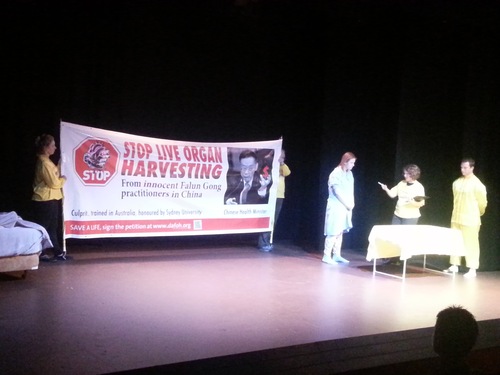(Minghui.org) Teenager Sarah suffers from a life-threatening disease. Her death is only months away unless she gets a new heart. Finding a matching organ usually takes several years, according to her doctor, except for in China where the waiting time is surprisingly much shorter.
The Perfect Heart, a half-hour play staged on September 19, 2014, during the Hills Festival of Theatre 2014, captivated the audience at the Marloo Theatre from the very beginning.
As the story unfolds, the audience learned that the organ sources in China are living Falun Gong practitioners. Prisoners of conscience are killed on demand – this is why the wait time is so short in China.
Facing the ultimate ethical question of saving one life by killing another, how will Sarah and her family choose? And why is something as horrible as organ harvesting even happening in China?
Audience member Comino said that the tragic story moved her to tears. “The performance was short, but it let us in on a big, important topic.” She had seen practitioners distributing flyers and had learned from them about the brutal persecution in China, including organ harvesting from living practitioners.
“When I heard about this back then, I felt bad about it,” she said, “But seeing it portrayed in the drama here today made my heart ache. It was as if the coldblooded deed was taking place right here in front of me. It was just awful.”
 The Perfect Heart, a drama presented during the Hills Festival of Theatre 2014 in West Australia, focused on live organ harvesting from Falun Gong practitioners in China
The Perfect Heart, a drama presented during the Hills Festival of Theatre 2014 in West Australia, focused on live organ harvesting from Falun Gong practitioners in China
Behind the Scenes: An Issue We Cannot Ignore
John de Beaux and Alison Seiler, the screenwriter and director of the play, met during a performance training class in Perth in West Australia three months ago. Discussing a potential collaboration for an upcoming drama festival late this September, John, who already had a deep understanding of live organ harvesting, decided to work on something to raise awareness of this atrocity.
The collaboration went well. John's in-depth knowledge of the subject and its ethical implications helped his screenwriting, and a draft was ready in a short time. Through discussing and refining the script, Allison not only threw herself into the play, but also captivated her family, including her father, mother, and brother, who were previously unaware of the tragedy.
Meirion Griffiths, Allison’s father, played the role of a practitioner in the drama. “We are Christians, not Falun Gong practitioners. But this is an issue we cannot ignore.” He said this experience made him realize the importance of freedom of belief, especially when viewing it from the point of view of someone who has been deprived of this privilege.
Sarah Langrid, who played two roles in the drama, was not a practitioner, either. “One challenge I had was to understand the topic, so that I could present it and ensure audience gets it.” She said she joined this project a little late compared to the others involved. “But we have a good team, and everyone was so helpful.”
Michael, whose wife played Sarah’s mother, was moved by the theme. He said he did not know about this issue in the past, but now, “I am proud of my wife’s efforts to bring this important topic to public notice.”
“The biggest challenge was to memorize the script and stick to it,” said Alison. This was because the dialogues were based on extensive research and were therefore not only factual, but also very informative. “In other words, the words are precise and to the point.”
This put lots of pressure on Sarah Welsford and Kara Shaw, who play two Falun Gong practitioners in the play. They said they took the lines very seriously, “Because the words carry so much weight, we did not want to make a mistake.” “To help the audience understand such a complex and serious situation in a 30-minute play is not easy.”
The play is scheduled to be performed again at Hackett Hall in Floreat on September 27 at the 2014 Dramafest, a festival hosted by the Independent Theatre Association in West Australia.
All content published on this website is copyrighted by Minghui.org. Minghui will produce compilations of its online content regularly and on special occasions.









